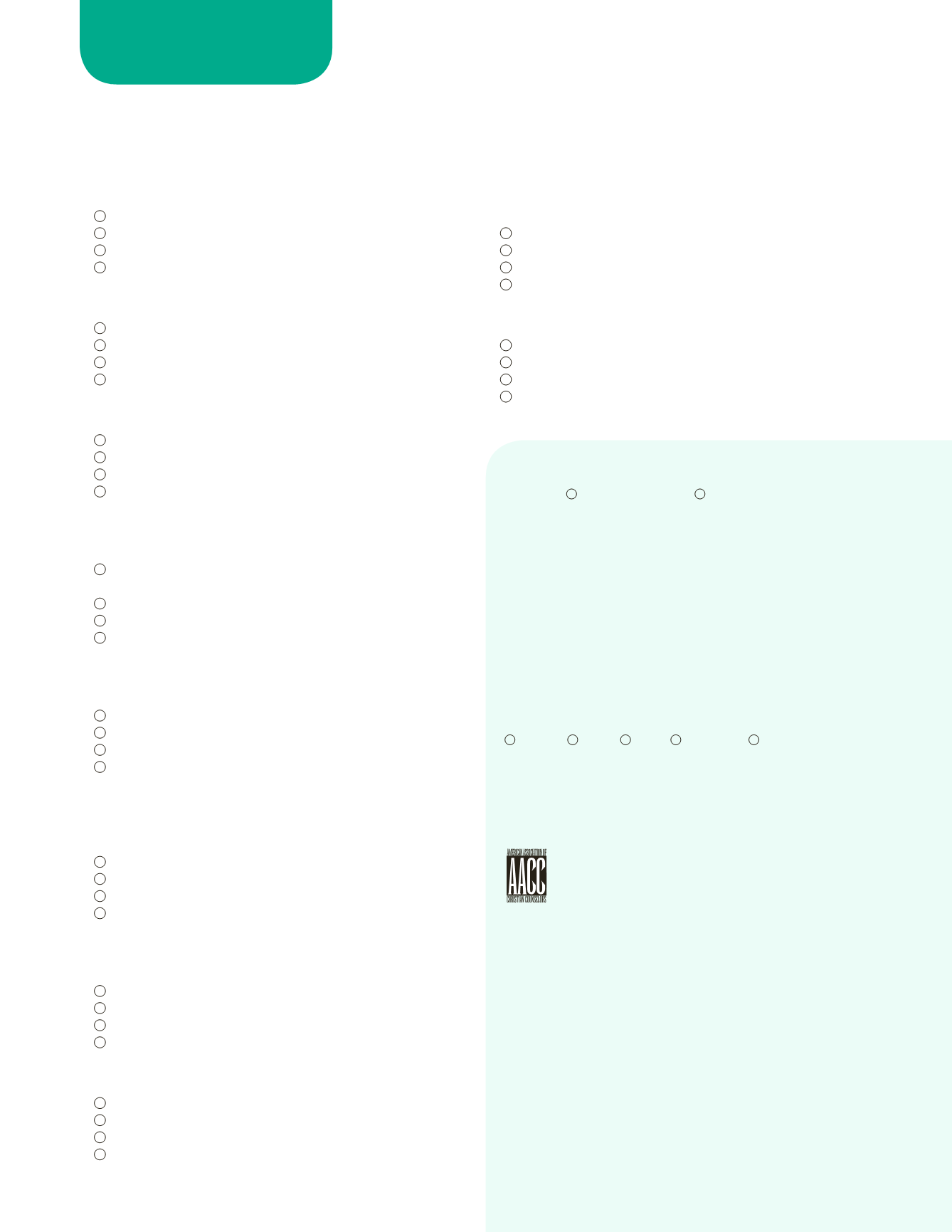
Answer the following questions from this issue of Christian Counseling Today by marking the appropriate circle. Once completed, you may
send in this entire page or a photocopy with your payment to the address below. Please do not send cash. The quiz is open-book and you will
need a minimum score of 70% to receive a letter of completion.
Acting Out or a Ticking Time Bomb? – Steve Warren
1. The transactional or reciprocal model for treating ODD
●
a. looks at how the school system disciplines opposition
●
b. strictly looks at the biological causes of ODD
●
c. looks at how the parent and child interact together
●
d. looks at early childhood developmental patterns
Elimination Disorders in Childhood – Trina Young Greer
2. Primary encopresis refers to
●
a. children who have never responded to potty training
●
b. a condition existing in primary school age children
●
c. bed wetting that occurs during the day
●
d. soiling clothes that began late in childhood
A Brief Guide to Evidence-based Practice… – Gary Sibcy
3. Sibcy says the gold standard treatment for childhood OCD is
●
a. a form of reality therapy developed by Glasser
●
b. a form of CBT developed by John March at Duke
●
c. the use of thought stopping and reframing techniques
●
d. the reevaluate, resist, replace and redirect technique
Learning Disorder or Learning Style?... – Cynthia Ulrich
Tobias
4. According to the author
●
a. if your child is diagnosed with a learning disorder, seek a
second opinion
●
b. it is critical to focus on your child’s strengths
●
c. as adults, we often get hired for what got us in trouble in school
●
d. all of the above
Light it Up Blue: Understanding Autism Spectrum Disorders
– Eric Scalise and Stephanie Holmes
5. By law, schools are not required to provide assistance for autism until
●
a. a formal diagnosis is made
●
b. the child’s disruptive behavior becomes intolerable
●
c. a formal request is made in writing by the parents
●
d. all of the above
Psychiatric Medications for Children and Adolescents –
Edward John Kuhnley
6. One of the biggest problems regarding medication management for
children is
●
a. parents do not want their children on drugs
●
b. compliance by the child
●
c. drugs create unforeseen damaging side effects in children
●
d. children often overdose on their drugs
Reactive Attachment Disorder and Disinhibited Social
Engagement Disorder – Joshua Straub
7. One of the most significant changes in the
DSM-5
for RAD is
●
a. it has been recognized as a biological disorder
●
b. it has been moved to an Axis II disorder
●
c. its subtypes are now two separate disorders
●
d. all of the above
Sit Still and Pay Attention: Children with ADHD – Linda Mintle
8. The PATS study concluded that
●
a. symptoms treated early did not persist in later childhood
●
b. despite treatment with medication, children did not improve
●
c. diet was a significant factor in ADHD
●
d. intense sunlight during the day increased ADHD in children
Stigmatized Kids: Learning and Intellectual Disabilities –
Carrie Fancett Pagels
9. The author lists which of the following as the “key” for treatment
●
a. the initial diagnosis
●
b. an extensive medical evaluation
●
c. complete psychological testing
●
d. cognitive restructuring
The Therapeutic Powers of Play… – Josephine Olson
10. Sandplay therapy allows children to manipulate figures and
●
a. increase self-worth and self-esteem
●
b. establish close bonds with the therapist
●
c. create a subjective world
●
d. overcome parental alienation
«
Childhood Development Disorders
chr istian counsel ing today, vol . 20, no. 2
counsel quiz
(exactly as it appears on card)
Please print clearly
3 CE credits for NBCC or 1 CE for APA
Check one:
●
$25 AACC Member
●
$30 non-AACC Member
Name_ ____________________________________________________________
Address___________________________________________________________
City_______________________________________________________________
State____________________________________ Zip_ _____________________
Phone_____________________________________________________________
E-mail Address_ ____________________________________________________
Licenses/Certifications (type and #)_ ___________________________________
Signed_ _____________________________ Date__________________
●
Check
●
Visa
●
MC
●
Discover
●
American Express
Card#_ ________________________________ Exp._ __________________
Name on Card__________________________________________________
Signed_ _______________________________________________________
Mail To:
CE Coordinator
AACC, P.O. Box 739, Forest, VA 24551
Learning Objectives
Participants will:
1. Increase awareness and content expertise on current trends in mental health practice.
2. Be able to articulate a more comprehensive understanding of this issue’s core theme.
3. Be able to integrate spirituality and faith-based constructs into the delivery of care.
Participant Evaluation
Please rate the following on a scale of 1–5 (1 meaning
Poor
and 5 meaning
Excellent
):
1. _______ This issue of CCT is relevant to my practice as a mental health professional.
2. _______ The articles in this issue are comprehensive and well written.
3. _______ I would recommend this home-study program to other professionals.
The AACC is approved by the American Psychological Association (APA) to offer continuing education
for psychologists, is a National Board for Certified Counselors (NBCC) Approved Continuing Education
Provider (ACEP
TM
), and meets the qualifications for continuing education credit for MFTs and LCSWs
as required by the California Board of Behavioral Sciences (#3552). The AACC adheres to all APA and
NBCC continuing education guidelines and maintains responsibility for this program and its content. Each
individual should be aware of his/her state’s licensure/CE requirements. This Counsel Quiz also meets the
ongoing CE requirements for counselors, life coaches, and crisis responders who are credentialed through
the International Board of Christian Care (IBCC). Please allow 3-6 weeks for processing.


